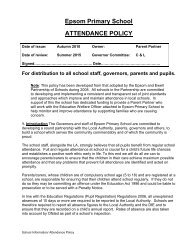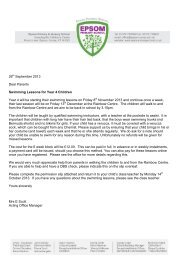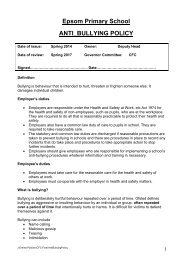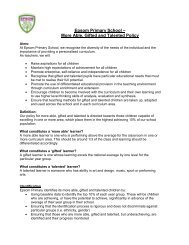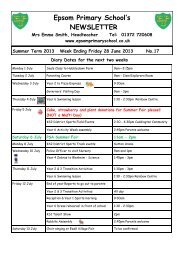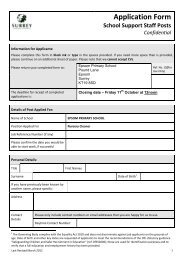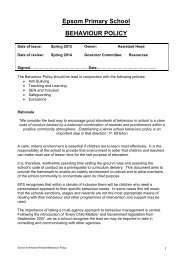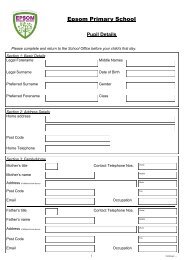Teaching and Learning Policy - Epsom Primary School
Teaching and Learning Policy - Epsom Primary School
Teaching and Learning Policy - Epsom Primary School
You also want an ePaper? Increase the reach of your titles
YUMPU automatically turns print PDFs into web optimized ePapers that Google loves.
<strong>Learning</strong> intentionsThe effective use of learning intentions improves pupil motivation <strong>and</strong> achievement. It is imperativethat children know what they must focus on <strong>and</strong> what they need to do to be successful in thelesson. To be effective, L.I. need to be: Should be taken from medium term planning. They may also take account ofcurriculum targets.Should be decontextualised – focus on the skill not the contentBased on prior learning – the link between current learning intentions <strong>and</strong> previousor future learning should be made more explicit; the Big Picture/<strong>Learning</strong> journeydisplay can be used t support this practice.Written as the title where possible using the words ‘I am learning to...’Marked against-children need to know where they have met the L.I.Short term <strong>and</strong> focused within a lesson, but may form part of a longer termobjective e.g. to punctuate correctly may be broken into learning stepsSuccess criteriaThe success criteria are the stepping stones to meeting a learning intention; they show pupils howto be successful in a task. Where possible, children should be involved in designing successcriteria <strong>and</strong> evaluating their work against these.For maximum impact, success criteria are: Focused on the key skill taught Most effective when generated or contributed to by children, but must be know byteachers first Constantly referred to – at the start, during <strong>and</strong> as an assessment tool at the end ofa lesson The same for all-differentiation by supported activity Based on models of good work which are used to generate or exemplify thesuccess criteria Used by teachers <strong>and</strong> pupils to evaluate <strong>and</strong> improve work including the use of self<strong>and</strong> peer assessment. Evidenced in learning. Pupils from end of Y1-Y6 should be expected to demonstratewhere they have met the s.c. Teachers model this process in the EYFS <strong>and</strong> Y1.Weekly timetables must be: Emailed to the Headteacher by 9am each Monday morningHome <strong>Learning</strong> opportunities (see homework policy)Homework has a key part in consolidating <strong>and</strong> extending children’s learning. Teachers areresponsible for setting <strong>and</strong> marking homework in line with the school policy.<strong>Teaching</strong> AssistantsEach class has an assigned teaching assistant; teachers are responsible for the effective direction<strong>and</strong> deployment of TA’s to support learning. Teachers hold daily planning <strong>and</strong> feedback meetingswith TA’s <strong>and</strong> are responsible for ensuring learning intentions <strong>and</strong> activities are clear. T.A.’s shouldwork with a variety of children across the week <strong>and</strong> many are trained in the implementation ofsecond <strong>and</strong> third wave intervention programmes.Specialist supportAdditional support is provided to identify pupils so all children can access <strong>and</strong> fulfil their potential.Support may be given to pupils with special educational needs, to pupils who speak English as anadditional language or to those with a specific gift or talent. (See inclusion policies)Extended provisionWe provide a variety of activities to support <strong>and</strong> enrich learning; these include pre <strong>and</strong> after schoolclubs.Website:<strong>Learning</strong>/<strong>Teaching</strong>_<strong>Learning</strong>_<strong>Policy</strong>_2013



